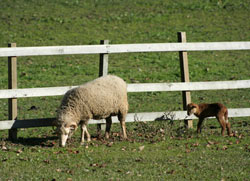New generation of acidosis inhibitors
The EC-funded RUMEN-UP project focused on the development of plant-extract-based dietary supplements to replace chemical additives. The aim was to reduce overall methane formation and also bloating and lactic acidosis. Project partner University of Reading concentrated its efforts on the risks surrounding the condition lactic acidosis. Under normal feeding conditions, lactic acid is produced only at low levels. However, lactic acid production by bacteria can be life-threatening for a number of animals. High levels of lactic acid result in a significant drop in pH disrupting the normal fermentation process. This can occur to a degree that a balance cannot be reached again and the animal dies. In most cases, lactic acidosis is manifested as a milder pathology causing some distress but not leading to death. The most efficient way to reduce the symptoms and alleviate the condition is by suppressing the growth of lactic acid - producing bacteria. Researchers showed that the plant species Lactuca sativa and Urtica dioica displayed lactic acid lowering activities by suppressing bacterial activity. These results could form the basis of a new generation of plant-based additives that could benefit livestock across the European Union and beyond.







